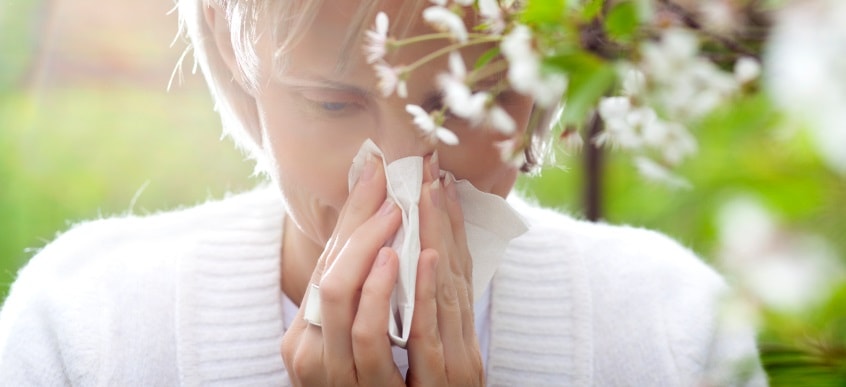Around 10-15% of adults in North America suffer from seasonal allergies caused by pollen and mold, and the number keeps rising. Scientists are still not sure why allergies are becoming more widespread. The global climate change can have something to do with it: increased levels of carbon dioxide can help some allergy-inducing plants and molds thrive. On the other hand, our immune systems can take a beating as a result of environmental pollution. After all, spring allergy is just an overblown reaction of your immune system to substances that cannot actually harm you.

For those who suffer from spring allergy, the season of blooming and first leaves can mean weeks and months of suffering. We have spoken to Miranda Chen – a leading customer care specialist at Canadian Health&Care Mall, one of the major online pharmacies in Canada – about what one should do to survive the spring allergy season.
Q.: Miranda, is there a way to cure spring allergy and make it go away for good?
A.: Unfortunately, no. So far, it is not clear why some people’s immune system reacts this way; in this sense, spring allergy has much in common with auto-immune diseases such as lupus, rheumatoid arthritis, and Crohn’s. For those with a severe allergy, immunostimulating shots are available. For the rest, there are very efficient ways to treat the symptoms.
Q.: Is it necessary to go to the doctor, or will over-the-counter antihistamines be enough?
A.: We advise our customers to pay a visit to their physician first. One reason is that you many need prescription-grade meds (especially nasal sprays) when the allergy season is particularly intense, as it happened last year. The second reason is that symptoms of some viral or bacterial infections can mimic allergy. Such diseases include mononucleosis, cytomegalovirus infection, toxoplasmosis, and many others. If your nasal congestion lasts for weeks, your mucus runs clear, and you have no fever or muscle pain, it is most probably allergy, but it is better to be sure.
Q.: What are the main types of meds that help most?
A.: At Canadian Health&Care Mall, we stock a wide variety of anti-allergy drugs, including corcicosteroid sprays that reduce inflammation in the airways, thus helping with nasal congestion (they include Nasonex and Flonase, for example), and antihistamine pills, such as Periactin and Allegra, that help with the general feeling of malaise, nasal symptoms, and headaches. However, you should not underestimate the beneficial effect of simple saline sprays and solutions. You can buy them or even prepare one yourself, dissolving some marine salt in water. Washing your nose and gargling with saline solution is not particularly pleasant, but it does help with inflammation and is very efficient when you have a running nose. However, you should not overdo it: twice a day is enough. There is data that some people become literally addicted to saline nose wash and get very nervous when they don’t have it.
Q.: What about exercising during the allergy season?
A.: If you are used to exercising outdoors, you may have to change your routine. In the morning, check the current pollen counts (there are websites for that), and if they are going to be high in the afternoon, for example, then try to do your run or bicycle ride – or shopping and any other outdoor activities – in the early morning. If the pollen counts are to remain high all day, go to the gym instead or do a yoga workout at home. Unfortunately, in the couple of months when pollen and molds are rife, you may have to organize your day around your allergy.
Q.: What else can you do to reduce the severity of the allergy?
A.: You should find out what exactly triggers your allergy. Not many know about a phenomenon called priming – it’s when you are allergic to one thing, but the allergy intensifies when some other allergene is present. For example, you can be allergic to household mold, but your allergy will become worse in the pollen season. To know exactly what you are allergic to, you should do special medical exams. This will allow your doctor to choose the meds best adapted to your case.
Q.: How can you isolate yourself from pollen?
A.: Try to prevent pollen from entering your home by keeping the windows shut and running the airconditioner. By contrast, if you are allergic to household molds, keep the windows open. When you come back from outside, change your clothes at once and wash your hair and take a shower if you can. If your allergy to pollen is pretty bad, consider wearing a medical mask over your nose and mouth when you are outside. Close the car windows when you are driving, including the sunroof, and use the option to circulate the air inside the compartment.
Q.: Are there any limitations on the activities you can do, apart from exercising outdoors?
A.: You should be very careful when cleaning. Washing and dusting the floor brings you in direct contact with molds, especially when it involves carpets. You should defintely wear a mask, but it is better that somebody else in your family does the cleaning. Don’t sprinkle herbicides or pesticides on your lawn yourself. Don’t collect dry leaves – they are full of mold.



